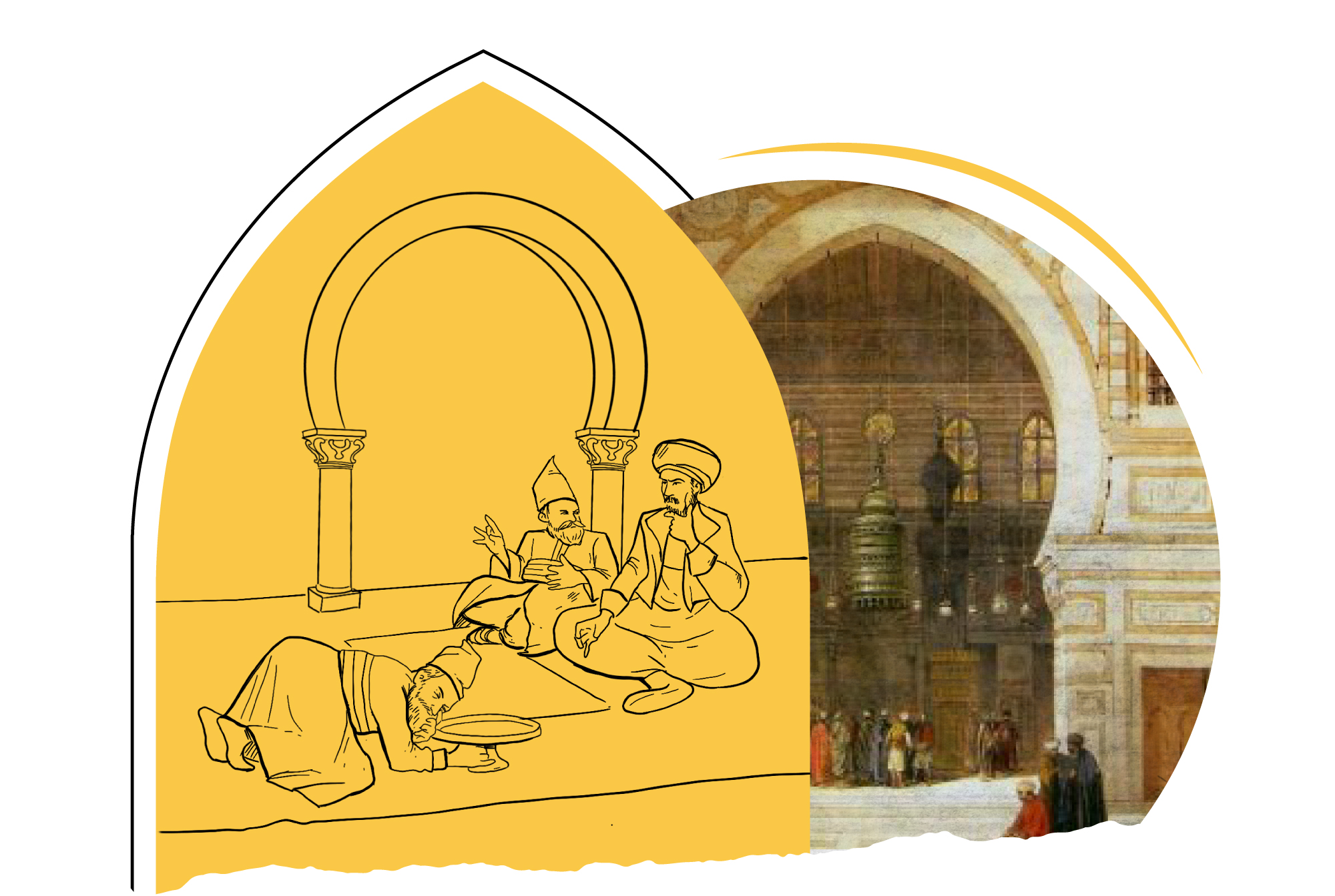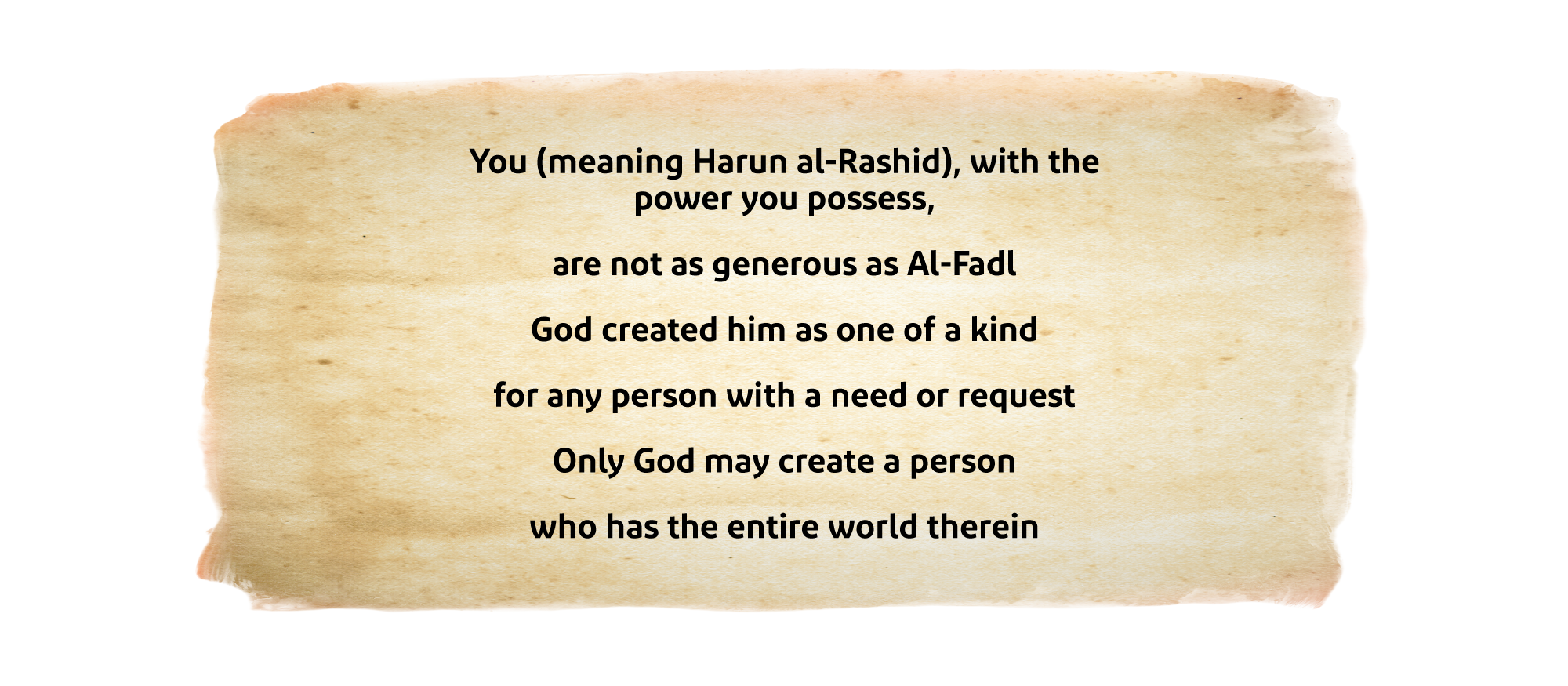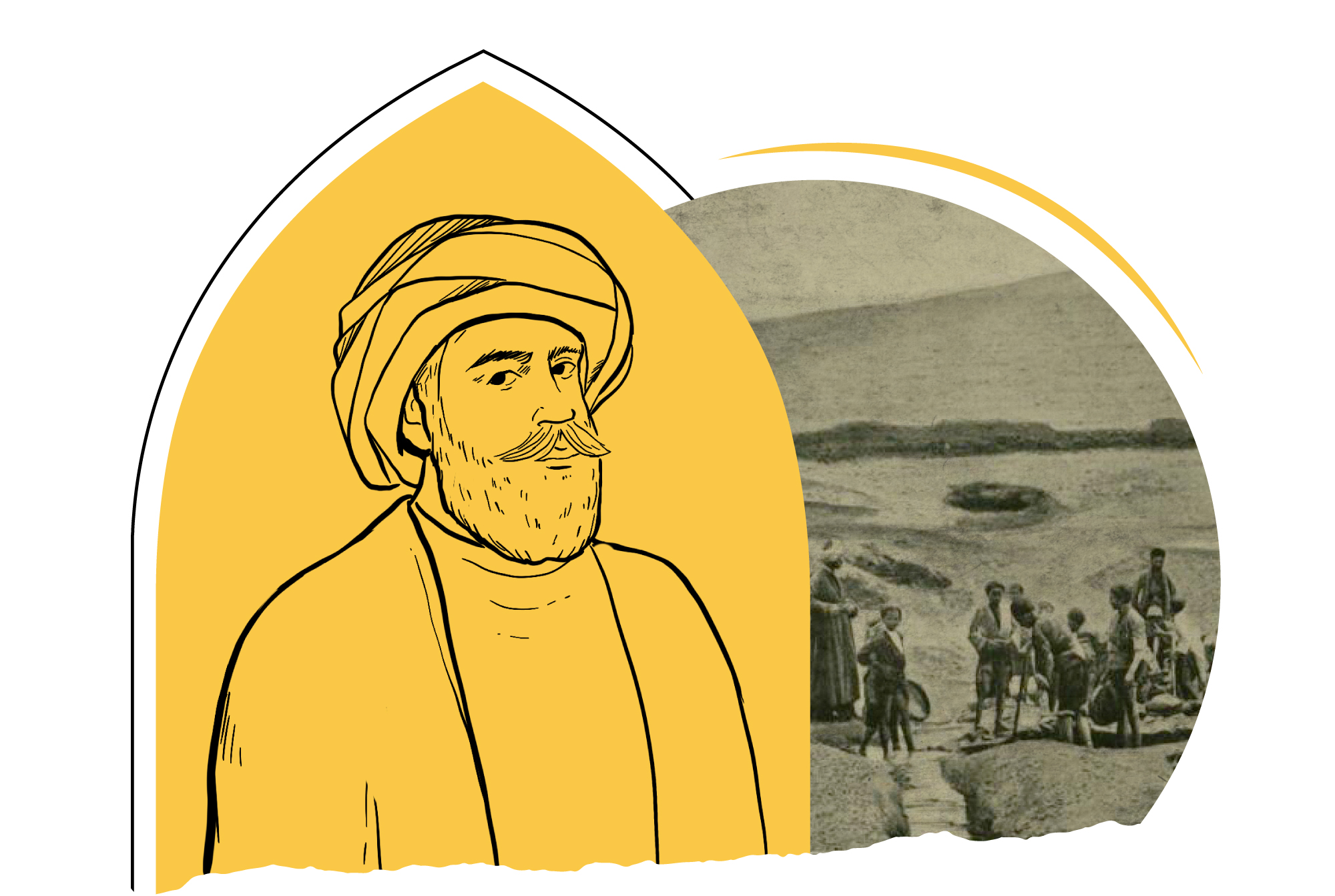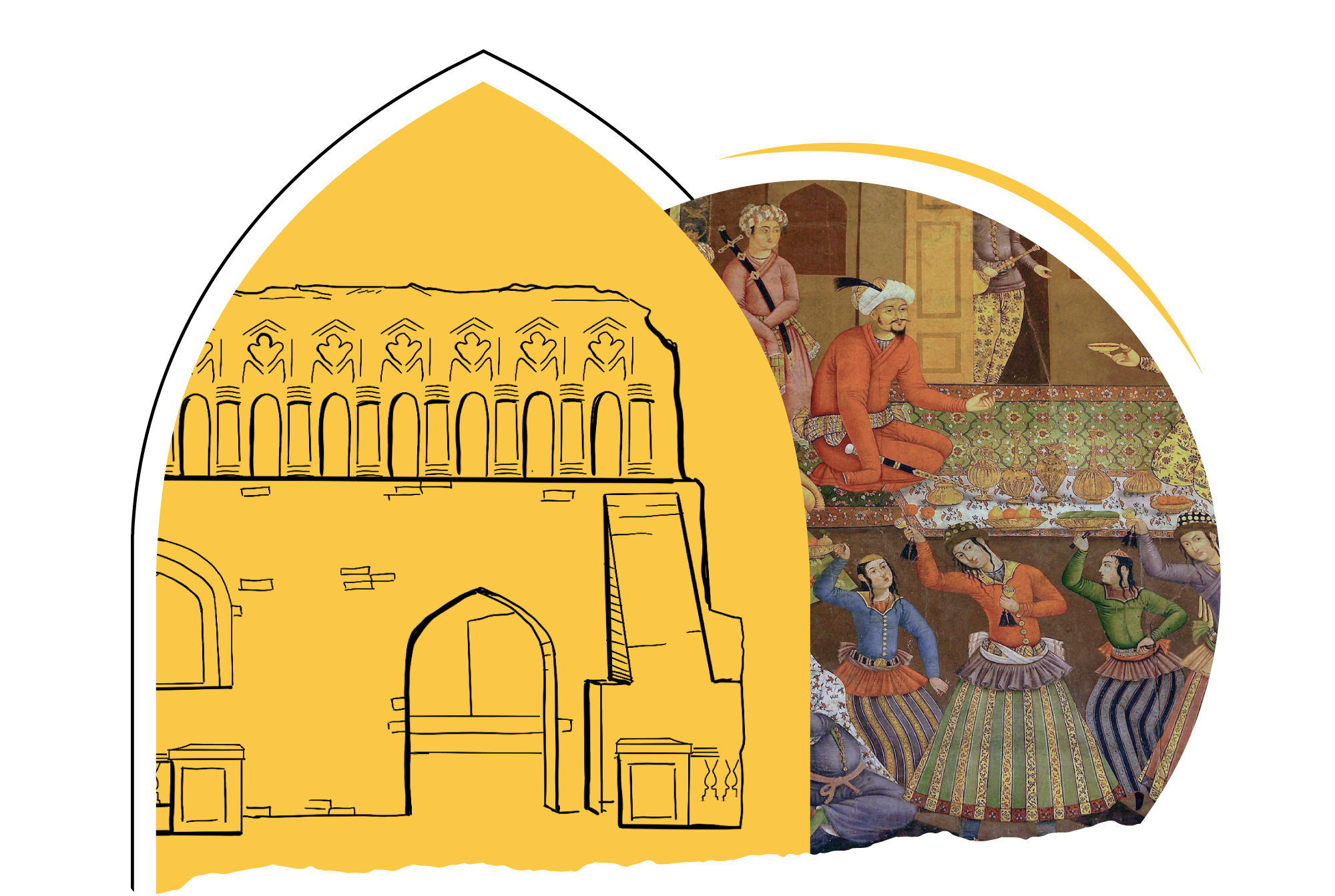
The “Barmakaized” in Abbasid State Era
Accused of hiding their Magi creed and practicing their rituals in the basements of their palaces
Every beginning has an end. This existential axiom applies to the negative impact that the Barmakids left on the state while the Abbasid caliphs are inattentive. They realized only very late that the Barmakids were working to empower the Persian race, striving to overthrow the Abbasids throne in retaliation against the Arab Muslims, whom they had always considered a major cause behind the fall of the last Persian empire at the hands of Al-Faruq Omar Ibn Al-Khattab, may Allah be pleased with him.
Barmakids’ penetration of power and the court reached a point where everyone considered them the “apparent state”, until some called it the “Barmakid Atate” during the reign of Caliph Harun al-Rashid. It can be said that the Barmakids almost cut the vein of the Arab state when they insisted on al-Ma’mun assuming the position of guardianship of the Covenant, given that his mother was Persian and because he was raised by Ja’far ibn Yahya.
The Barmakids had an (external) state within the Abbasid state, through which they practiced their authority and control.

In this context, the Barmakids were not satisfied with controlling the joints of political and economic power until the Abbasid court. They paid attention to the power of what is known today as “media war”. They recruited those who well-reputed and whose achievements were praised to present them to the people as the actual owners of the state, so as to ensure their loyalty. They sought to facilitate the passage of malicious Magian ideas, hence was their success in controlling the base after they succeeded in controlling the top, even for a while.
The Barmakids found their way to the gatherings of common people through wise men, scholars and poets, so they lavished gifts on them and took them as a way to the hearts of some people. Al-Hafiz al-Suyuti elaborates on this point, saying: “There was almost no one among the scholars, wise and great men and friends that the Barmakids were not extensively generous to. Ja’far fave fifty thousand dinars of gold repeatedly I during his entire mandate, until they obtained the description that “So-and-so has been Barmakized”
The final say on the truth of the political goals of the Barmakids may be difficult to determine given the silence of the historians of that era regarding the hidden political details of the Abbasid state and members of the ruling family (Al-Abbasa, Khaizarun, Zubaydah and Al-Rashid). Some went on to say that there were secret practices of the Barmakids that made them classified outside the circle of Islam and that “hidden basements were found in all Barmakids’ dwellings that no one else could enter. There was also a secret temple in front of which a continuous flame was lit in a “nawasa” golden vessel, in front of which they secretly performed unknown religious rituals and offered sacrifices that had nothing to do with Islam”.
If there are historians who challenge this narration, it is still proven that the Barmakids did not see that they were “employees” in the state or eve “its men” at the highest estimation, but rather they acted as the actual owners thereof. They did not hide their hatred towards everything that is Arab, even if it was the Abbasid caliph himself, although they practiced political piety cunningly and sought to empower the followers and then control the joints of the court. They also attempted to win over the people of solution and decision, as well as the other “influencers” to direct the helm of political decision.
It can be said that the Barmakids competed with the Abbasid caliphs in politics and governance until they became a subject of gossiping. Their biography was tackled by narrators and poets who strived to approach and flatter them. Barmakids used to “send to poets and allure them to write in their praise. Poets did not hesitate to stand at their doors and utter their poems, regardless of their status in poetry, in the state, in the councils of the caliphs or among the scholars…, because the Barmakids’ political status, their social status and their economic status… as well as their great giving … all rendered their poets’ tongues that pronounce Barmakids’ favors and merits to Islam and the state”.
Some poets exaggerated their praise of the Barmakids and raised them to a rank higher than that of the caliph himself. We find a poet like Abu Nawas saying the following in Al-Fadl ibn Yahya Al-Barmaki, referring to Harun Al-Rashid:

Power and authority took over the hearts of the Barmakids and they thought that positions and money were capable of give them sovereignty over the Abbasid political decision. Thus, they aroused the wrath of the public, the caliph, his wife and Hashemites’ seniors, only for the Barmakids to wake up to a disaster that they had not expected or guessed. Perhaps the excessive confidence with which the Barmakids began to act and the slips of the tongue of Ja’far ibn Yahya under the influence of “intoxicants of love” precipitated Harun al-Rashid’s vengeance on that Persian family. It was only a night before Jaafar’s head was cut off and plans were developed to remove Yahya Al-Barmaki and his son Al-Fadl. The Barmakids were then dispersed in all lands, thus the collapse of the most dangerous Persian projects to overthrow the Arab state represented in the Abbasids state.


- Ahmed Amin, Haroun Al-Rashid (Cairo: Hindawi Foundation, 2014).
- Saleh Ramadan, Baramkids Shu’ubi Approach, Research Journal of the College of Basic Education, University of Mosul, p.4 (2010).
- Kouider Bashar, Barmakids Role in the History of the Abbasid State (Algeria: Institute of History, 1985 AD).
- Ali Al-Amr, Persians Political Impact in the First Abbasid Era (Cairo: Al-Degwi Press, 1979).
- Muhammad Diab Al-Atlidi, Informing People of What Happened to the Barmakids with the Abbasids (Beirut: Dar Sader, 1990).
- Muhammad Barang, Baramkids in the Shadows of the Caliphs (Cairo: Dar Al-Maarif, n.d.)


Persian Project
In the Abbasid Era
The Persians influenced the beginning of the Abbasid state and worked to strengthen their position, power and influence among the Abbasids, by persuading the caliphs that they were the most capable of leading the stage of establishment. They also sought to distort the Arab elements and cast doubt on ever Arab person; claiming that he is loyal to the Umayyads and their state that fell in the year (132 AH). From that door, specifically, the Persians had power, authority and domination.
It went even worse with the Persians’ desire to reap the fruits of their advocacy of the Abbasid call and to collect the spoils behind that. From this point, their incursion into the affairs of administration and their control over the financial affairs of the state increased till they became controller of the treasury of the state. It became clear to everyone that this control of the state’s economy had become a serious threat to the authority of the Abbasids themselves.
Perhaps the biography of Abu Muslim al-Khurasani is the best example of that in the early period of the history of the Abbasids, as he undertook a key role in the success of the Abbasid call through his family and clan from the people of Khorasan. He constituted one of the most important centers of power in the state and was keen, at the beginning of the era of the state, to impose his control over the management of Khorasan region’s affairs, due to the richness of that region and the seizure of its income. It was evident that Abu Muslim did not differentiate much between public money and his own private money and collected huge fortunes that were reflected in the manifestations of extravagance in his life, in addition to his gifts and grants to gain the loyalty of his supporters to protect himself in case of any political fluctuations in the state.
The Persian scheme began from an early period of Islamic history and expanded in the Abbasids era.

Historian Muhammad al-Khudari records for us the fear of Abu Ja’far al-Mansur, who was still crown prince at the time, about the increasing influence of Abu Muslim al-Khorasani and his encroachments on the treasury, in addition to his use of money in politics to gain supporters. Al-Khudari tells about Al-Mansur’s pilgrimage trip, where he was accompanied by Abu Muslim, and how Al-Mansur noticed that Abu Muslim’s gifts and grants along the way, even more generously than Al-Mansur’s gifts. Abu Muslim was deliberately showing his influence in front of everyone, which outraged Abu Jaafar al-Mansur, who realized the extent of the danger Abu Muslim represents.
When Al-Mansur assumed the caliphate, he had a constant concern that Abu Muslim, in his administration of Khorasan affairs, which is one of the richest regions of the state, might exploit it to “getting rid of Al-Mansur, then choose another son for the caliphate, who would be at his disposal and under his authority, so the matter would return to the Persians”. At that point, Al-Mansur started working to remove Abu Muslim from managing the affairs of Khurasan and to take over another place of less importance and wealth, yet Abu Muslim refused. Al-Mansur also proceeded to conduct a financial accounting of what Abu Muslim had acquired from the spoils, but Abu Muslim refused that procedure as well and perhaps what he said to Al-Mansur’s messenger is the best example of his mentality, his view of himself and his feeling that he is the state, where the caliph has nothing to do therewith. He told him: “Is it possible for me to be trustworthy over blood, but not trustworthy over the money?!”. Hence, Abu Ja’far Al-Mansur decided to get rid of him.
The same applied to the Barmakids y after Al-Khorasani with the Abbasid state, which took another chapter of the Persians’ control over the state’s finances and the danger of that on decision-making in the state. This is in addition to their use of public money to serve their own interests and their financial mismanagement. The Algerian researcher, Bashar Kouider, devoted an entire chapter to the Barmakids and their role in financial management and their control over the treasury.
In addition, the Persian element took complete control over the treasury of the Muslims and all state resources were at their disposal. They became incredibly wealthy and lavished extravagantly on themselves and their supporters. This prompted the people to resort to the Barmakids rather than to the normal place of caliphs’ councils. Undoubtedly, this was the largest infringement on the authority of the state, not to mention being the largest organized campaign to squander public money and exhaust state treasury.
Thus, the financial corruption of the Persian element in managing the affairs of the state’s bureaucrats led to people’s complaints about that matter, in addition to overburdening the state treasury with illegal expenses, constituting centers of power within the state. It was inevitable that the state would pay attention to that mite, s eating away at the backbone of governance and administration.


- Ahmed Amin, Haroun Al-Rashid (Cairo: Hindawi Foundation, 2014).
- Saleh Ramadan, Baramkids Shu’ubi Approach, Research Journal of the College of Basic Education, University of Mosul, p.4 (2010).
- Kouider Bashar, Barmakids Role in the History of the Abbasid State (Algeria: Institute of History, 1985 AD).
- Ali Al-Amr, Persians Political Impact in the First Abbasid Era (Cairo: Al-Degwi Press, 1979).
- Muhammad Diab Al-Atlidi, Informing People of What Happened to the Barmakids with the Abbasids (Beirut: Dar Sader, 1990).
- Muhammad Barang, Baramkids in the Shadows of the Caliphs (Cairo: Dar Al-Maarif, n.d.).
- Muhammad Shaaban, Abbasid State (Beirut: n.p., 1981).

From Ibn Yusuf’s Al-Kharaj
Persian economic measures’ Corruption in Abbasid state era
The Persians enjoyed wide power and control over the administration in the first era of the Abbasid state, which enabled them to supervise the vital pillars of the state. Economic institutions are the key pillar on which they relied, similar to the Barmakids, which supported their authority. Given the circumstances the Abbasid state went through during Al-Hadi era, a financial leakage occurred and impacted its budget. Persians’ financial policy was based on a fundamental principle of recognizing the situation as it was, pending coming up with new regulations that would change economic life in a way that matches their policy. This is what Al-Tabari mentioned about the Barmakids; that they were extremely active in building palaces and constructing houses without a specific goal, confirming that their families were fond of glamor, extravagance and love of appearances in order to win over the seniors and impose respect on the public. On the other hand, they worked to help their workers masterfully build, beautify and decorate their homes, even if their expenses were covered from the state budget.
Persians’ goal was not to encourage the movement of urbanization and construction as much as it was an extravagant waste to prepare for the gatherings of amusement, as mentioned by Al-Jahshiari in his book, The Ministers, and other historians who elaborated on the colors and shapes of the Persians’ gatherings of amusement in the Abbasid state era. This is surprising and call for exclamation marks as their companions (in drinking) used to wear special clothes made of silk, with bright colors, and unique perfumes, as was the custom of the ancient Persians. This entailed extravagance and expensive gifts to those followers, not to mention that such gathering may have deviate from the legal frame. Frequent historical narratives about the Barmakids indicate their love for pretense and vanity; for example, their attempt to spread sophistication and embroidery in clothes in the Abbasid society, which had a great impact on the state budget. It was common about them that they do not hesitate to buy their clothes for any financial value, no matter how expensive they are.
The Persians also sought to influence the financial economy and control the minting of gold coins in the state, to the extent that they minted gold dinars that differed from the then-current coining technique in the Abbasid state, on which the following poetic verse was engraved:

It is worth noting that their economic policy had negatively impacted the economy of the Abbasid state, including the imposition of arbitrary taxes and collection of land. Among the procedures that they introduced was (the land system), which prompted the Abbasid caliph to consider it and entrusted the famous judge, Abu Yusuf, in Al-Rashid era, to examine that system and submit an adequate report thereon, clarifying the organization of lands’ ownership and the extent of their conformity with the offices of his ministers. That report was issued in the form of the famous Kitab al-Kharaj.
They re-applied the ancient Persian economic systems with all their details, negative aspects and their contradiction with the teachings of Islam.

Among the tax systems that were commonly used during the period of Persian domination was the Tax Collectors “Al-Qebala” System; i.e., a person undertakes to collect some taxes from taxpayers in some areas and then takes them for himself, in exchange for his commitment to pay a specific amiunt, agreed-upon in advance, to the treasury. That system was similar to what is the “Commitment System” of the Ottoman era, which involved exploitation and domination over the people and their rights. Judge Abu Yusuf ordered to stop working with that system, saying: “I saw that you see only darkness in the state. The Collector, in collecting al-kharaj, would oppress the people, force them to what they cannot bear and tyrannize them. In this, and in similar acts, is the destruction of the state and its people. The collector does not care about that, nor he cares about the legality of what he collects. He cares only about the benefit he gets from what he collects, so he resorts to tormenting the people to take what they have, including setting them tied under the sum or hanging stones in their necks, which is a great torment and corruption that Allah forbids. Allah Almighty ordered to take their forgiveness in collecting Al-Kharaj and not to shoulder them beyond their capacity. I resent that collection system because the people are not safe with the collectors, who treat them as aforementioned, harming them and their property. Allah forbids corruption, saying: (And do not cause corruption on the earth after its restoration) [Al-A’araf, 56/58] and (And if he were to wield authority, he would try to cause corruption in the land, and to ruin the crop and the stock, and Allah does not like corruption.) [Al-Baqara, 205]. Several nations were destroyed because of injustice to people. Burdening the people with Al-Kharaj and obligating them to what they are not supposed to pay is prohibited and not permitted”.
Abu Yusuf al-Qadi wrote in his book about tax collectors selected by the Persians saying that they were ignorant of details of the tasks assigned thereto and that among the conditions of employing them was to choose those with competence. However, for the Persians, the only condition was loyalty and devotion to them. That is why he was of the opinion that such collectors should be monitored continuously and strictly to prevent them from oppressing the peasants and landowners.


- Abu Youssef Yaqoub Al-Ansari, Al-Kharaj, edited by Taha Abdel-Raouf et al (Cairo: Al-Azhar Library, n.d.).
- Ibn Abd Rabbo Al-Andalusi, Al-A’qd Al-Fareed, (Beirut: Dar Al-Kutub Al-Ilmiya, 1984).
- Kouider Bashar, The Role of Baramkids in the History of the Abbasid State (Algeria: Institute of History, 1985).
- Ibn Jarir al-Tabari, History of the Messengers and Kings, edited by Muhammad Abu al-Fadl, 2nd edition (Cairo: Dar al-Ma’arif, 1967).
- Muhammad al-Jahshiari, The Book of Ministers and Writers, edited by Mustafa al-Sakka and others (Cairo: n.d., 1938).
- Muhammad Abdullah, Financial Jurisprudential Views of Imam Abi Yusuf through his book Al-Kharaj (Sudan: Gezira University, 2018).





